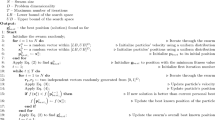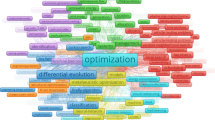Abstract
Particle swarm optimization (PSO) is widely used to solve various optimization problems, such as robotics visual perception and intelligent control under uncertainties, due to its simple rules and easy implementation. However, the PSO has premature convergence in the optimization process, which will lead to inaccurate problems such as uncertainties of the control system. To improve PSOs performance, a self-regulating particle swarm optimization with mutation mechanism (SRM-PSO) is proposed in this paper. SRM-PSO combines the mutation mechanism, self-regulation and self-perception strategy. The mutation mechanism is introduced to generate trial particle moving in different directions to maintain population diversity. Self-regulation and self-perception enable particles to be updated in different ways for fast exploration and intelligent exploitation. To validate the effectiveness of the SRM-PSO, experiments are conducted in the CEC2017 test suite. The test results indicate that SRM-PSO outperforms two related variants, and five representative PSO variants. Further, SRM-PSO is applied to several real-world optimization problems, which demonstrates its potential and competitiveness.
Similar content being viewed by others
References
Maharana, H.S., Dash, S.K.: Comparative Optimization Analysis of Ramp Rate Constriction Factor Based PSO and Electro Magnetism Based 1 for Economic Load Dispatch in Electric Power System. In: 2019 International Conference on Applied Machine Learning (ICAML), pp. 63–68 (2019)
Pham, T.X., Siarry, P., Oulhadj, H.: Segmentation of mr brain images through hidden markov random field and hybrid metaheuristic algorithm. IEEE Trans. Image Process. 29, 6507–6522 (2020)
Wang, Y., Chen, Y., Miao, Z.: Obstacle avoidance planning for de-icing robot based on PSO-fuzzy. Control Engineering of China 21(2), 298–302 (2014)
Li, X., Chen, Y., Yu, X.: Parameters Optimization of Mechanical Arm PID Controllers Based on CLPSO Algorithm. In: 2011 6Th International Conference on Computer Science & Education (ICCSE), pp. 56–60 (2011)
Bai, X., Gao, X., Xue, B.: Particle Swarm Optimization Based Two-Stage Feature Selection in Text Mining. In: 2018 IEEE Congress on Evolutionary Computation (CEC), pp. 1–8 (2018)
Ramos-Figueroa, O., Quiroz-Castellanos, M., Mezura-Montes, E., Schtze, O.: Metaheuristics to solve grouping problems: A review and a case study. Swarm Evol. Comput. 100643, 53 (2020)
Holland, J.H.: Adaptation in natural and artificial systems: an introductory analysis with applications to biology, control, and artificial intelligence, Q Rev Biol. 69 (1) 126C137 (Mar 1994)
Wu, G., Shen, X., Li, H., Chen, H., Lin, A., Suganthan, P.N.: Ensemble of differential evolution variants. Inf. Sci. 423, 172–186 (2018)
Karaboga, D., Basturk, B.: A powerful and efficient algorithm for numerical function optimization: artificial bee colony (ABC) algorithm. J. Glob. Optim. 39, 459–471 (2007)
Mirjalili, S., Mirjalili, S.M., Lewis, A.: Grey wolf optimizer, adv. Eng. Softw. 69, 46–61 (2007)
Wu, G.: Across neighbourhood search for numerical optimization. Inf. Sci. 329, 597–618 (2016)
Kennedy, J., Eberhart, R.: Particle swarm optimization. In: Proceedings of ICNN’95 - International Conference on Neural Networks, 4, pp. 1942–1948 (1995)
Shi, Y., Eberhart, R.: A Modified Particle Swarm Optimizer. In: 1998 IEEE International Conference on Evolutionary Computation Proceedings. World Congress on Computational Intelligence (Cat. No. 98TH8360), pp. 69–73 (1998)
Shi, Y., Eberhart, R. C.: Empirical study of particle swarm optimization. In: Proceedings of the 1999 Congress on Evolutionary Computation-CEC99 (Cat. No. 99TH8406), 3, pp. 1945–1950 (1999)
Zheng, Y., Ma, L., Zhang, L., Qian, J.: A unified particle swarm optimization scheme. In: Proceedings of the IEEE International Conference of Computational Methods in Sciences and Engineering, pp. 221–226 (2003)
Gao, Y., Duan, Y.: A New Particle Swarm Optimization Algorithm with Random Inertia Weight and Evolution Strategy. In: 2007 International Conference on Computational Intelligence and Security Workshops (CISW 2007), pp. 199–203 (2007)
Wu, J., He, X., Zhao, W., Wang, R.: Exponential Inertia Weight Particle Swarm Algorithm for Dynamics Optimization of Electromechanical Coupling System. In: 2009 IEEE International Conference on Intelligent Computing and Intelligent Systems, pp. 479–483 (2009)
Han, W., Yang, P., Ren, H., Sun, J.: Comparison Study of Several Kinds of Inertia Weights for PSO. In: 2010 IEEE International Conference on Progress in Informatics and Computing, pp. 280–284 (2010)
Bao, G., Mao, K.: Particle Swarm Optimization Algorithm with Asymmetric Time Varying Acceleration Coefficients. In: 2009 IEEE International Conference on Robotics and Biomimetics (ROBIO), pp. 2134–2139 (2009)
Clerc, M., Kennedy, J.: The particle swarm - explosion, stability, and convergence in a multidimensional complex space. IEEE Trans. Evol. Comput. 6(1), 58–73 (Feb 2002)
Kennedy, J.: Small worlds and mega-minds: effects of neighborhood topology on particle swarm performance. In: Proceedings of the 1999 Congress on Evolutionary Computation-CEC99 (Cat. No. 99TH8406), 3, pp. 1931–1938 (1999)
Mendes, R., Kennedy, J., Neves, J.: The fully informed particle swarm: simpler, maybe better. IEEE Trans. Evol. Comput. 8(3), 204–210 (Jun 2004)
Liu, Q., Wei, W., Yuan, H., Zhan, Z., Li, Y.: Topology selection for particle swarm optimization, Inf. Sci. 363, 154–173 (2016)
Liang, J., Qin, A., Suganthan, P. N., Baskar, S.: Comprehensive learning particle swarm optimizer for global optimization of multimodal functions. IEEE Trans. Evol. Comput. 10(3), 281–295 (2006)
Lynn, N., Suganthan, P.N.: (2015) Heterogeneous Comprehensive learning particle swarm optimization with enhanced exploration and exploitation. Swarm Evol. Comput. 24, 11–24 (2015)
Lin, A., Sun, W., Yu, H., Wu, G., Tang, H.: Global genetic learning particle swarm optimization with diversity enhancement by ring topology, Swarm Evol. Comput. 44, 571–583 (2019)
Zhang, H., Yuan, M., Liang, Y., Liao, Q.: A novel particle swarm optimization based on preyCpredator relationship, Appl. Soft. Comput. 68, 202–218 (2018)
Aydilek, I. B., hybrid firefly, A: particle swarm optimization algorithm for computationally expensive numerical problems. Appl. Soft Comput. 66, 232–249 (2018)
Tan, C., Chang, S., Liu, L.: Hierarchical genetic-particle swarm optimization for bistable permanent magnet actuators, Appl. Soft. Comput. 61, 1–7 (2017)
Tanweer, M. R., Suresh, S., Sundararajan, N.: Self regulating particle swarm optimization algorithm, Inf. Sci. 294, 182–202 (2015)
Suresh, S., Savitha, R., Sundararajan, N.: A sequential learning algorithm for complex-valued self-regulating resource allocation network-CSRAN. IEEE Trans. Neural Netw. 22(7), 1061–1072 (2011)
Khan, S. U., Yang, S., Wang, L., Liu, L.: A modified particle swarm optimization algorithm for global optimizations of inverse problems. IEEE Trans. Magn. 52(3), 1–4 (2016)
Andrews, P.S.: An Investigation into Mutation Operators for Particle Swarm Optimization 2006 IEEE International Conference on Evolutionary Computation, pp. 1044–1051 (2006)
Awad, N., Ali, M., Liang, J., Qu, B., Suganthan, P.: Problem definitions and evaluation criteria for the CEC 2017 special session and competition on single objective real-parameter numerical optimization, Tech Rep. (2016)
Perez-Bellido, A.M., Salcedo-Sanz, S., Ortiz-Garcia, E.G., Portilla-Figueras, A.: A Hybrid Evolutionary Programming Algorithm for Spread Spectrum Radar Polyphase Codes Design. In: Gecco 2007: Genetic and Evolutionary Computation Conference, pp. 682–688 (2007)
Higashi, N., Iba, H.: Particle swarm optimization with Gaussian mutation. In: Proceedings of the 2003 IEEE Swarm Intelligence Symphosium, pp. 72–79 (2003)
Sarangi, A., Samal, S., Sarangi, S. K.: Analysis of Gaussian & Cauchy Mutations in Modified Particle Swarm Optimization Algorithm. In: 2019 5Th International Conference on Advanced Computing & Communication Systems (ICACCS), pp. 463–467 (2019)
Tang, J., Zhao, X.: Particle Swarm Optimization with Adaptive Mutation. In: 2009 WASE International Conference on Information Engineering, pp. 234–237 (2009)
Tanweer, M. R., Auditya, R., Suresh, S., Sundararajan, N., Srikanth, N.: Directionally driven self-regulating particle swarm optimization algorithm, Swarm Evol. Comput. 28, 98–116 (2016)
Tanweer, M.R., Suresh, S., Sundararajan, N.: Dynamic mentoring and self-regulation based particle swarm optimization algorithm for solving complex real-world optimization problems. Inf. Sci. 326, 1–24 (2016)
Dash, P.P., Patra, D.: Mutation based self regulating and self perception particle swarm optimization for efficient object tracking in a video. Measurement 144, 311–327 (2019)
Harrison, K.R., Engelbrecht, A.P., Ombuki-Berman, B.M.: Optimal parameter regions and the time-dependence of control parameter values for the particle swarm optimization algorithm. Swarm Evol. Comput. 41, 20–35 (2018)
Blackwell, T.M., Bentley, P.J.: Dynamic search with charged swarms. In: Proceedings of the 4th annual conference on genetic and evolutionary computation, pp. 19-26 (2002)
Li, C., Yang, S., Nguyen, T.T.: A self-learning particle swarm optimizer for global optimization problems, IEEE Trans. Syst. Man Cybern. b: Cybern. 42 (3) 627C646 (2012)
Salajegheh, F., Salajegheh, E.: PSOG: Enhanced Particle swarm optimization by a unit vector of first and second order gradient directions. Swarm Evol Comput. 46, 28–51 (2019)
Yousri, D., Allam, D., Eteiba, M. B., Suganthan, P. N.: Chaotic heterogeneous comprehensive learning particle swarm optimizer variants for permanent magnet synchronous motor models parameters estimation. Iran. J. Sci. Technol. Trans. Electr. Eng. 44, 1299–1318 (2020)
Das, S., Suganthan, P.N.: Problem Definitions and Evaluation Criteria for CEC 2011 Competition on Testing Evolutionary Algorithms on Real World Optimization Problems, Technical Report, Jadavpur university, Nanyang Technological University, 341–359 (2010)
Dereli, S., Koker, R.: Strengthening the PSO algorithm with a new technique inspired by the golf game and solving the complex engineering problem. Complex Intell Syst. 7(3), 1515–1526 (2021)
Dereli, S., Koker, R.: IW-PSO Approach to the inverse kinematics problem solution of a 7-DOF serial robot manipulator. Sigma. J. Eng. Nat. Sci. 36(1), 77–85 (2018)
Tang, H., Sun, W., Yu, H.: A.Lin, M. xue, Y. Song, A.novel hybrid algorithm based on PSO and FOA for target searching in unknown environments. Appl. Intell. 49(7), 2603–2622 (2019)
Dereli, S., Koker, R.: A meta-heuristic proposal for inverse kinematics solution of 7-DOF serial robotic manipulator: quantum behaved particle swarm algorithm. Artif. Intell. Rev. 53(2), 949–964 (2020)
Song, B., Wang, Z., Zou, L., An improved, P S O: Algorithm for smooth path planning of mobile robots using continuous high-degree Bezier curve. Appl. Soft Comput. 106960, 100 (2021)
Acknowledgements
This work was partially supported by the National Natural Science Foundation of China (Project No. 61803089), the Natural Science Foundation of Fujian Province (No. 2019J01213). The authors thank Anping Lin for sharing code.
Author information
Authors and Affiliations
Corresponding author
Additional information
Publisher’s Note
Springer Nature remains neutral with regard to jurisdictional claims in published maps and institutional affiliations.
Rights and permissions
About this article
Cite this article
Chen, Y., Liang, J., Wu, Y. et al. Self-Regulating and Self-Perception Particle Swarm Optimization with Mutation Mechanism. J Intell Robot Syst 105, 30 (2022). https://doi.org/10.1007/s10846-022-01627-y
Received:
Accepted:
Published:
DOI: https://doi.org/10.1007/s10846-022-01627-y




